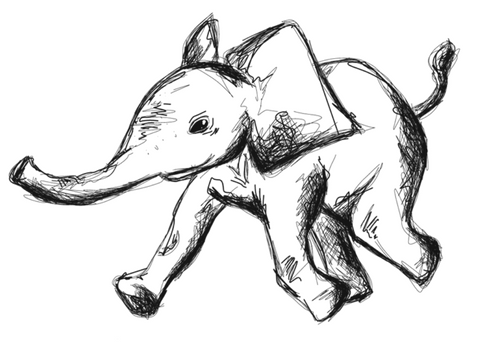Recently, some front-line workers who fight against pornography addictions have noticed how some unique factors, which are seemingly disconnected from porn, have helped contribute to successfully quitting porn.
Two people stand out. The first is Jay Stringer, a licensed mental health counselor, ordained minister, and frequent Covenant Eyes blog contributor. In his years of counseling men and women for unwanted sexual behaviors, including pornography use, he started noticing trends among his patients, linking certain childhood traumas or certain life states to certain types of pornography. He recently commissioned a large-scale study of porn users which largely confirmed his own personal findings.
While the results of Stringer’s study are still being evaluated, he did tell a group of Covenant Eyes employees that one big recurring factor in porn use was a sense of purposelessness. Porn users often see themselves as failures, they have unmet needs, they feel guilty and overwhelmed. They’re frequently stuck in dead-end jobs without hope of upward mobility. In short, they didn’t know who they were or where they were going in life, and that drove them to porn to soothe themselves.
Meanwhile, Alexander Rhodes, founder and manager of the online recovery organization NoFap, noticed a related trend. By studying data gathered informally from NoFap’s users, he found that those who were most successful in abstaining from porn included other activities—sports, hobbies, etc.—as part of their recovery process.
The Elephant Exercise
A simple exercise will demonstrate why this works. Take a moment to look at this picture of an elephant. Study its features for a minute or two, until you can close your eyes and envision it.
Now take out your phone and set a timer for two minutes. In these two minutes, I want you to do one thing: don’t think about the elephant.

Don’t think about it.
Don’t think about its long trunk, its tusks, its ears, its saggy skin.
Don’t ask yourself whether it lives in a zoo, or if it has any family.
Don’t think about the elephant.
For two whole minutes, don’t think about the elephant.
Were you successful?
If the answer was no, why not? If the answer was yes, why?
Chances are good, if you had trouble not thinking about the elephant, it’s because you were fixating on the task. Maybe you even repeated the phrase “Don’t think about the elephant” to yourself multiple times.
But if you were successful, it’s probably because you didn’t think about the task much at all. Maybe you were thinking about your dinner plans, or a movie you recently saw. Maybe you even started out thinking about the elephant, but then allowed your train of thought to wander to other zoo animals.
Finding Freedom by Changing Our Focus
Often, when we decide to quit porn we fixate on it, making it harder for ourselves to resist. We may believe that mentally thinking, “No, don’t go there! Don’t click that,” will help us resist the temptation, and in the heat of the moment, it may help. But in the end, when we focus all of our willpower on NOT doing something, it ironically makes it harder to resist that thing… and at the same time it makes it harder to resist other temptations as well.
This was confirmed in research conducted by social psychologist Daniel Wegner in the 1980s. He asked one group of participants not to think of a white bear for five minutes, and ring a bell if they did, then to think about white bears for another five minutes, again ringing the bell when they thought about it. He then compared the results to a group of participants who were only asked to think about the white bear. Lea Wineman explains,
“At that point, the participants thought of a white bear even more often than a different group of participants, who had been told from the beginning to think of white bears. The results suggested that suppressing the thought for the first five minutes caused it to “rebound” even more prominently into the participants’ minds later.”
So where does this leave us?
Rather than simply not thinking about pornography anymore, the better option is to think about something else instead.
The emphasis there is “think about something else.” Aristotle once postulated that “Nature abhors a vacuum.” It’s true of human nature as well. It’s not possible to simply think of nothing, and if we’re not proactive about choosing what to think about instead, we may actually wind up thinking about worse things.
Jesus illustrates this in a parable in Matthew 12:43-45:
“When the unclean spirit has gone out of a person, it passes through waterless places seeking rest, but finds none. Then it says, ‘I will return to my house from which I came.’ And when it comes, it finds the house empty, swept, and put in order. Then it goes and brings with it seven other spirits more evil than itself, and they enter and dwell there, and the last state of that person is worse than the first. So also will it be with this evil generation.”
Jesus’ focus is on the evil spirit… but what’s the man’s role in all of this? Notice that the house is empty when the spirit returns to it. It’s as if the man kicked a terrible roommate out of his apartment, but he never took the roommate’s name off the lease or changed the locks. He never filled the emptied room. And the man went on a business trip and didn’t leave a house sitter, and when he came home the roommate had returned and had added seven of his freeloading friends to the lease.
Many people treat pornography similarly. They quit cold-turkey for a while, but they never find something to fill the void left by porn, and they eventually either return to porn or turn to a different vice.
One person even told us he saved his marriage after he successfully quit porn, only to lose it in the end because, as he told us, “I never replaced porn with something else.”
If we want to find lasting freedom from pornography, simply quitting porn won’t be enough. We need to find community, and change our environment (not just the paint on the wall, but things like what we have on in the background for noise), and train ourselves to new habits.
The article was excerpted from our book Hobbies and Habits.










This is such a great article. I would just add (by way of encouragement, not correction) that the New Testament completely teaches this concept. Anytime we are told to ‘Put off’ the old, we are also told to put on the new. Ephesians 4 is a great example of this. Put off the old self (V.22) Put on the new self… (v.24).
Put away falsehood…(v. 25a)….Speak the truth…(v.25b)
Let the thief no longer steal but rather let him labor, doing honest work with his hands…. (v. 28)
Let no corrupting talk come out of your mouths, but only such as is good for building up… (v.29)
Let all bitterness…..be put away…(v. 31) Be kind to one another, tenderhearted….(v.32)
We are never told to just stop doing something. God, in His kind grace, always tells us what to replace sinful patterns with. How encouraging this is! He tells us to stop thinking of the elephant, indeed. But He also gives us plenty of things to think about in it’s place! He is good.
I thought I would share this so you know….there are two great things you can do first Get the Conquer Series
DVD and study program from Dr. Ted Roberts on pornography. The second thing is his 2-5 years recovery program
that starts with the 7-Pillars Study book that groups of men go through…it takes anywhere from 2- 5 years to break
this cycle depending on how much porn addition you have been involved with-its a great program we are using it
at our church and many men have been released from the chains of Satan and their additions. Check it out, I/we think
its a must for every church if we plan to win the battle over this sin.
Thanks for sharing, Bob.